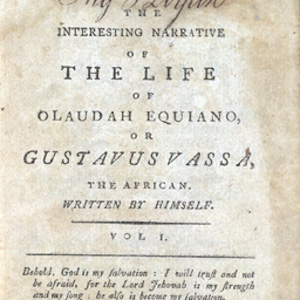Early Modern (1450 CE - 1800 CE)

The Interesting Narrative of the Life of Olaudah Equiano: Slave Ship
From the 16th to the 18th centuries, an estimated 20 million Africans crossed the Atlantic to the Americas in the trans-Atlantic slave trade.

The Interesting Narrative of the Life of Olaudah Equiano: Middle Passage
From the 16th to the 18th centuries, an estimated 20 million Africans crossed the Atlantic to the Americas in the trans-Atlantic slave trade.

The Interesting Narrative of the Life of Olaudah Equiano: Slave Auction
From the 16th to the 18th centuries, an estimated 20 million Africans crossed the Atlantic to the Americas in the trans-Atlantic slave trade.

A Narrative of the Life and Adventures of Venture A Native of Africa
In this excerpted source, Venture Smith recalls his experiences in the slave trade as a child. This source is especially important, as Smith gives a very vivid account of slave raiding, a common practice that took place during the peak years of the slave trade in the 18th century.

Letter to Panduranga Joshi Kulkarni
Although the self-immolation of Hindu widows was less common in western India than in Bengal, this letter confirms its occurrence in Maratha-ruled areas during the 1700s.

The Whole Duty of Woman
The following selection comes from a late 17th-century English advice book for women.

Peter Kolb Travel Narrative 2
Peter Kolb was a German astronomer and mathematician who lived at the Cape from 1705 to 1713. He was initially sponsored by a German baron to make astronomical observations in pursuit of a way to calculate longitude accurately.

Peter Kolb Travel Narrative 1
Peter Kolb was a German astronomer and mathematician who lived at the Cape from 1705 to 1713. He was initially sponsored by a German baron to make astronomical observations in pursuit of a way to calculate longitude accurately.

Journal of Jan van Riebeeck
Krotoa, called Eva by the Dutch, is the first Khoikhoi woman to appear in the European records of the early settlement at the Cape as an individual personality and active participant in cultural and economic exchange.

Children in the Slave Trade Table
The Trans-Atlantic Slave Trade: A Database on CD-ROM, edited by David Eltis, Stephen D. Behrendt, David Richardson, and Herbert S. Klein, contains the best quantitative evidence to date on the number of Africans sold into the slave trade.